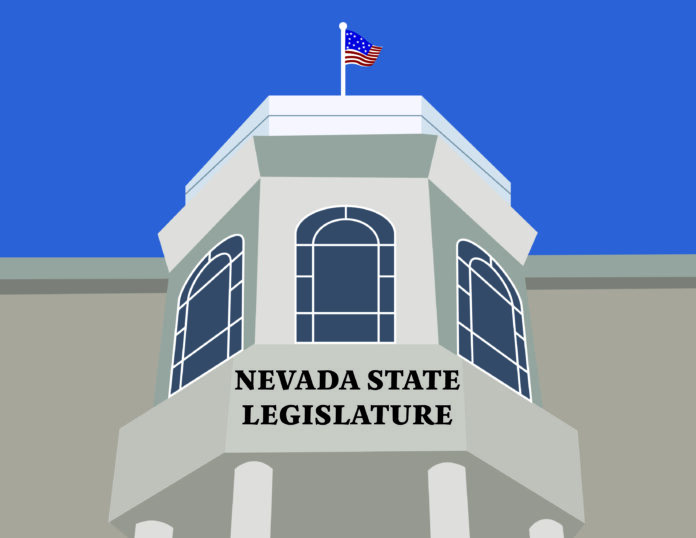During the ninth week of the Nevada legislative session, Rebels were proactively engaged in the policy-making process to further university initiatives and efforts. Marking the halfway point of the 120-day legislative session, UNLV leadership presented a variety of bills and celebrated UNLV College of Education Day on April 5.
Topics that took center stage during much of the ninth week were tuition waivers for children of veterans, constitutional proposals governing the election duties of the NSHE Board of Regents and revising a number of provisions for UNLV initiatives and projects. During these events and others, UNLV played a large role in the display and deliberations of the items.
The Assembly Committee on Education convened on April 4 to introduce provisions relating to AB279. The bill sought to waive tuition charges against students with a system parent who is a veteran or had been awarded a Purple Heart, an award presented to service members who have been wounded or killed in enemy action. During the presentation of the item, UNLV Director of Military and Veteran Services Ross Bryant introduced the bill alongside Assemblyman Reuben D’Silva.
At the presentation of the bill, D’Silva stated that there are three primary reasons that this provision is needed. “First, many of these students are taking care of a disabled parents, second is PTSD as a result of their service days, and last is the growing percentage of Americans serving in uniform,” said D’Silva. “In addition to these reasons, there is evidence to show that a bill like this can likely boost enrollment in the military since there are incentives.”
Echoing the sentiments provided by D’Silva, Bryant added to the presentation describing his service to UNLV students and families in service. Over his 10 years as UNLV’s Director, Bryant stated that his office has helped eight thousand military affiliates while distributing thousands of federal dollars. Citing the direct benefits that military families bring to UNLV, Bryant also discussed how vital military families are to the makeup of Nevada’s economy, but that they may travel elsewhere if there is not enough support.
“Other states have full grant waivers,” said Byrant. “So a lot of these families will travel to those states. I really hope these families come to our state with the implementation of this bill.” While the bill was simply presented and received position feedback from legislators, it will be voted on at a future meeting.
Later in the day, the Senate Committee on Legislative Operations & Elections introduced and passed SJR7– a senate joint resolution to provide governing authority to the legislature to, “provide by statute for the governance of the state university and for the auditing of public institutions of higher education” in Nevada. The introduction of SJR7 follows a similar 2020 ballot question that narrowly failed, which was initially called AJR5. Following a number of calls to bring more oversight to the university regents, SJR7 was reintroduced with hopes to officially pass during the 2024 general election.
During public comment following the presentation of the resolution, many members in Carson City and Las Vegas testified in support of the resolution. Joe Arrascada, the current vice-chair for the board of regents, attended the meeting in opposition to SJR7 claiming that the initiative sought to undermine the regents altogether.
“This initiative diminishes the voices of the voters as they have already voiced their opinion,” said Arrascada. “Most importantly, this is not looking to increase any initiatives to help students and instead creates uncertainty.”
James Dean Levitt, a former regent, was the only other member to testify in person against the resolution. During Levitt’s passionate testimony, he was cut off three times for running over the allotted time for comment. The Nevada State Board of Faculty Alliance testified neutrally on SJR7 citing concerns for political and partisan interference in academic freedom and standards.
Upcoming events of particular interest to the university community is the April 11 Senate Committee on Health and Human Services which will revise provisions on a number of items relating to medical school graduates, healthcare workers and resources for students facing homelessness.

